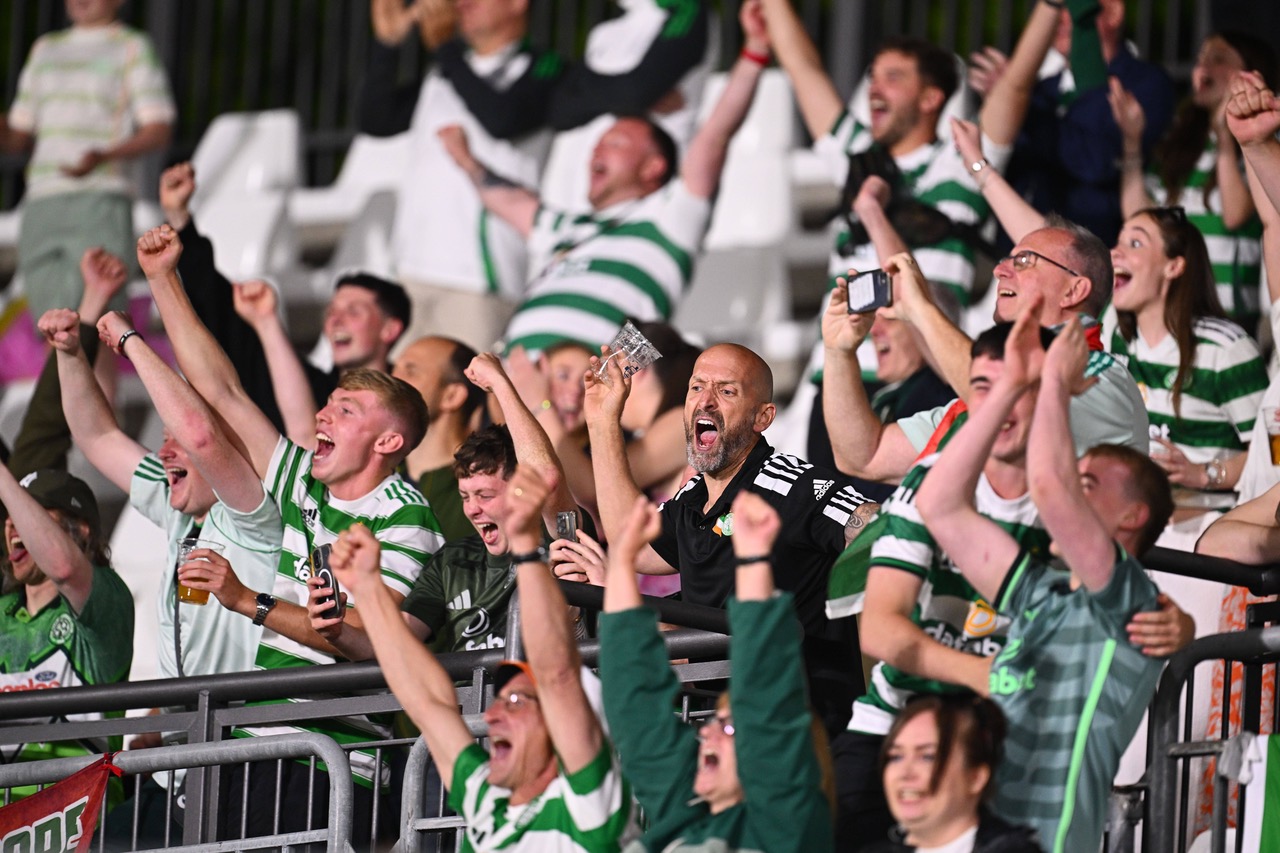MARTIN O’NEIL MADE HIMSELF A PERMANENT ENEMY OF ENTIRE RANGER FANS BASE OVER WHAT HE SAID WHEN ASKED ABOUT THE RIVALS
The rivalry between Celtic and Rangers — collectively often referred to as the “Old Firm” — is one of football’s most intense and historic local derbies. The two Glasgow clubs share not just geography, but decades of fierce competition, identity, titles and pride.
During Martin O’Neill’s period in charge of Celtic (2000–2005), he inherited a club hungry to re-assert dominance domestically and to challenge in Europe. Meanwhile Rangers were still a force, though the balance was shifting.
O’Neill’s record at Celtic was very strong: he won multiple major honours and re-established the club at a high level. He was well regarded for his ability to galvanise the squad and bring success. At the same time, the relationship between Celtic and Rangers was always fraught — each side’s supporters demand not only that their club wins, but crucially that the other club is beaten, humiliated perhaps, and shown up. Dominance isn’t just about trophies; it’s about the supremacy over your rival.
Thus any comment from a figure like Martin O’Neill about the Rangers side or the rivalry will be scrutinised, amplified, and often amplified emotionally by supporters.
The comment that triggered fury
The specific incident that created lasting annoyance (and, from the point of view of Rangers fans, enmity) was an early comment by O’Neill when asked about his mindset toward the four league fixtures Celtic would have against Rangers each season.
As O’Neill himself later admitted:
“I remember once saying, in my early days and an interview I did with Celtic, I said, ‘if we lost all four matches to Rangers, and won the league. I would be happy.’”
In essence, he placed winning the league above winning the head-to-head matches with Rangers: to him, the four Old Firm fixtures were a subset of the season; the ultimate prize was the league title. On face value, that is a rational strategy: win the league, properly mark your success. But the problem is that for fans of both clubs — especially for the Rangers side of the equation — the Old Firm matches are not just subsets: they have extra weight, symbolism and emotion.
Rangers fans (and indeed Celtic fans) expect the manager of either club to treat the Old Firm clashes as more than just another set of fixtures. From the Rangers perspective, hearing the Celtic manager give the impression that Celtic would be content to lose all four to them and still celebrate the title is deeply provocative — it diminishes the significance of those derby games and implies that Celtic’s rivalry focus does not prioritise beating Rangers.
O’Neill later acknowledged he received “a lot of calls from Celtic fans” in response to that remark:
“I am afraid, I got a lot of calls from Celtic fans, ‘we don’t want to hear that. We don’t want to hear that at all. … But I learned a lesson pretty quickly.”
So the comment created a stir not only among Rangers fans but among Celtic fans as well, who felt that the rivalry-games needed more respect than that.
Why the reaction was so strong
Several factors contributed to why this remark created a lasting negative mark in the Rangers fanbase and why it still gets referenced:
- Symbolism of the Old Firm
The four matches between Celtic and Rangers each season are more than just league games. They carry deep cultural, historical and emotional resonance. For Rangers supporters, the notion that the Celtic manager might not prioritise those games or might be content losing them is seen as diminishing their own club — a source of insult. - Perceived arrogance / devaluation
The comment could be interpreted as down-playing Rangers’ significance — suggesting that even if Rangers beat Celtic four times, Celtic could still be happy as long as they won the league. From a Rangers fan’s view, that is disrespectful. It implicitly places Rangers in a subordinate role. - Legacy and memory
Comments like this tend to stick in the memory of supporters. For a club with a large and passionate fan base like Rangers, such a remark becomes part of the club’s narrative of grievance: “We were not taken seriously.” Even if the quote was not intended maliciously, it becomes fodder for historical resentment. - Competitive context
At the time, the balance of power was shifting but Rangers still had strong credentials, and Celtic were re-asserting themselves. So the context of the remark was like rubbing salt into a wound for Rangers fans: the rival manager is saying “beating us doesn’t matter if we win the league” just at a time when Rangers supporters expect their club to be seen as a major threat.
The aftermath and what O’Neill did
After making that comment, O’Neill recognised its impact. He publicly reflected on how it ruffled feathers even among Celtic supporters and admitted he learned a lesson.
In his subsequent tenure, O’Neill did treat the Old Firm fixtures with due respect in terms of preparation, but the reputation of that single off-the-cuff remark had already lodged itself in the minds of many.
In later years, O’Neill has made further remarks that highlight the gulf he perceived between the two clubs:
For example, he told former Rangers player-manager Graeme Souness that there was a “gap, a chasm” between Celtic and Rangers, pointing out that the performance and quality of Rangers had declined.
He argued that Rangers had to improve, that Celtic needed a strong rival to stay competitive in Europe.
While that stance may have been more analytical, it further cemented his image as someone who was comfortable airing blunt views about Rangers — and that further upset their fanbase.
Why this made him “a permanent enemy” (from the Rangers fan perspective)
While “permanent enemy” may be hyperbole, the notion captures how the Rangers supporters long remembered the comment and built it into a broader narrative of antagonism. Some of the reasons:
- The quote exists as a symbol of perceived disrespect. For Rangers fans, being treated as “if we can beat you four times and you’d still be happy” isn’t just anything — it strikes at their sense of identity and competitive pride.
- Rivalries are about emotion and memory as much as facts. The old-firm rivalry is steeped in history, and remarks that touch a nerve become part of folklore. O’Neill’s comment became one such line — referenced and recalled whenever tensions rise between the clubs.
- It wasn’t a one-off; O’Neill’s continued remarks analysing Rangers’ problems, stating blunt truths about their form, gap to Celtic, etc., kept him relevant in the animosity. This means that in the minds of many Rangers supporters, O’Neill isn’t simply a former Celtic manager but a figure who kept reminding them of their shortcomings.
- The fact that O’Neill also acknowledged the backlash and admitted he learned the lesson doesn’t necessarily soften Rangers fans’ view — because from their side, the damage was done, the statement remains part of their club’s collective grievance.
Thus, from the perspective of many in the Rangers support, Martin O’Neill became a figure who symbolised Celtic looking down on them, and so in that sense he earned “permanent enemy” status — not in the sense he personally goes around antagonising them daily, but in the sense that his words lodged themselves into the rivalry’s fabric.
Looking deeper: Was O’Neill really insensitive or strategic?
To evaluate fairly: Was O’Neill being reckless, insensitive or simply strategic in his comment? A few considerations:
- On the one hand, he was emphasising a pragmatic strategic point: for a manager, winning the league is often more important than winning particular matches. That kind of focus is understandable.
- On the other hand, he significantly underestimated the emotion attached to those four fixtures vs Rangers. As he himself later admitted, the response of Celtic fans told him his comment mis-read where supporters stood. That suggests a moment of mis-judgement rather than malice.
- In later commentary, O’Neill seemed aware of how rivalry dynamics impact clubs, fans and seasons. His comments about Rangers needing to improve for Celtic’s sake show a more nuanced perspective — that rivalry helps drive performance.
- But, given his blunt style and willingness to criticise Rangers’ form publicly (for example describing certain Rangers teams as the worst he’d seen) he can’t claim to have softened his rhetoric in service of sensitivity. That may be a style of honesty, but it means he remains a figure of provocation in the minds of rival fans.
So while the original remark wasn’t necessarily an attempt to offend Rangers supporters, the effect was that it offended them, and O’Neill’s own subsequent words ensured it wasn’t quietly forgotten.
Legacy and reflections on the rivalry today
The remark remains part of the lore of the Old Firm rivalry, especially as Celtic have dominated domestically in recent years and Rangers have struggled to consistently challenge. In that context the comment is often recalled by Rangers fans as “We’re not treated as the rival you want to beat” type of grievance.
From Celtic’s side, O’Neill remains a revered figure — he delivered major success, he refocused the club, and he built a side that set the foundations for future dominance. Among Celtic supporters, the backlash to his early remark may have been more of a “lesson learned” anecdote than a lasting stain.
For Rangers supporters, though, the remark was a symbolic “you didn’t respect us enough” moment. And because O’Neill didn’t retract it fully and continued to make similar pointed remarks about Rangers, he became a fixture in their stories of rivalry.
In the broader scheme, O’Neill’s view that Celtic actually need Rangers to be strong to sharpen themselves is interesting. He said:
“I think for Celtic to be strong in the season, you need a strong Rangers side…”
This is a more constructive approach to the rivalry — but it arrived after the initial mis-judged comment and doesn’t erase its memory.
A few key takeaways
- Even a seemingly strategic or innocuous comment — “I’d be happy losing all four to you if we win the league” — can have huge emotional fallout when dealing with fierce rivals.
- Rivalries are not just about competition on the field; they’re about respect, symbolism and the narrative of supremacy.
- Figures like Martin O’Neill who sit on one side of a major rivalry often become permanently etched in the memory of the other side’s supporters — not for everything they did, but for the remarks they made that touched nerves.
- The broader point O’Neill later made (that you need your rival to be strong so you remain strong) is valid, but it doesn’t cancel the earlier moment of perceived disrespect.
- For Rangers fans, the incident remains part of the mythos of the rivalry as “we weren’t treated as your main priority” by Celtic. For Celtic fans, it is often recalled as an example of the manager being pragmatic but mis-reading the mood.
Conclusion
Martin O’Neill’s comment that he would be content with losing all four matches to Rangers and still winning the league stands out as a flashpoint. It triggered genuine bitterness among Rangers supporters and to some degree among Celtic fans. Whether or not he intended to offend, the remark struck a nerve, and because of his subsequent blunt commentary about Rangers and the rivalry, it became part of his legacy — especially among the opposing fanbase.
In rivalries like Celtic vs Rangers, words matter as much as results. A manager has to navigate not only tactics, but sentiment. O’Neill’s moment of mis-judgement reminds us how one off-hand line can shape perception for years — and in the world of football fandom, perception often becomes reality.








Post Comment